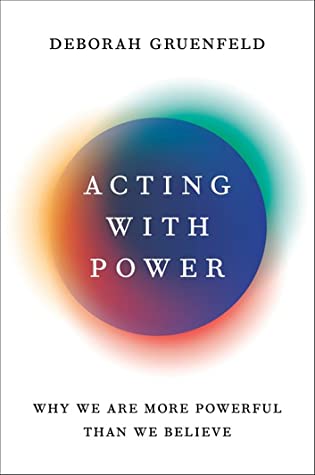
Acting with Power
Why We Are More Powerful Than We Believe
کتاب های مرتبط
- اطلاعات
- نقد و بررسی
- دیدگاه کاربران
نقد و بررسی

February 15, 2020
A professor at the Stanford Graduate School of Business considers power in the workplace and beyond. Gruenfeld, a social psychologist, teaches a course that shares a title with her first book. Its premise is that trying out roles of either high or low status--e.g., in plays like David Mamet's Glengarry Glen Ross or Caryl Churchill's Top Girls--can help us understand our own complicated feelings about power. While the book doesn't offer the exercises explored by the author's students, it does provide an in-depth examination of the ways we all, consciously or unconsciously, "play high or low" (terms that are more common in a theatrical setting) in our everyday life. Gruenfeld then provides useful ways to break out of our ruts. For the author, power is as much about connection as control, and it's morally neutral, capable of either good or evil effects depending on the players involved and their goals. Using examples drawn from politics, business, and personal life, Gruenfeld suggests ways in which power can be used for the greater good as well as techniques for avoiding becoming a victim of misused power. Perhaps her most original contribution is a chapter on the strategic value, at least on occasion, of "the art and science of playing power down." As she writes, "like playing power up, playing it down is an act, designed to make us appear less intimidating, less capable of winning a fight, and less ruthless than we might actually be. But this doesn't mean it isn't truthful." The author also offers ways to behave as a "supporting actor" and to avoid becoming a simple "bystander" when the balance of power needs to be shifted. Though the points Gruenfeld has to make don't easily stretch to book length, leading to a certain amount of repetition, she does articulate a reasonable analysis of power and how our understanding of it might be broadened. A sensible, practical guide to understanding and using personal power.
COPYRIGHT(2020) Kirkus Reviews, ALL RIGHTS RESERVED.

March 1, 2020
Named for a popular course Gruenfeld teaches at Stanford's Graduate School of Business, Acting with Power explores the nuanced ways in which power affects our interactions. While many people assume that the most powerful person in the room is the one seated at the head of the table, Gruenfeld shows that the truth is rarely so simple. She discusses the varied ways that, consciously or not, we play up or play down our own power and when those skills can be an advantage. Through the lens of theater, Gruenfeld shows how certain roles come with expectations of behavior, and how acting outside of those roles can cause challenges in power-sensitive situations. A new leader stepping into a position of power may feel the need to exert it due to insecurity, and Gruenfeld discusses ways to manage such fears. Gruenfeld also examines abuses of power and how to stop them. Offering an insightful look at a complicated subject, this book is a valuable tool for reflecting on one's own capacity for power.(Reprinted with permission of Booklist, copyright 2020, American Library Association.)

























دیدگاه کاربران